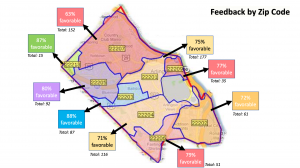Arlington lawmakers unanimously endorsed on Saturday ranked choice voting for use in next year’s primary election, after significant feedback from Arlington residents, most of which supported switching to this system.
The move will make Arlington the first jurisdiction in the Commonwealth of Virginia to adopt the system.
The Arlington County Board approved the voting method pilot for the 2023 County Board primary election. The method will only apply to the primary, not the general election, as the board seeks to use the primary as a trial run.
This type of voting system has become increasingly popular and as of September 2022, 56 cities, counties and states have ranked choice voting in place, according to FairVote, a national advocacy group for ranked choice voting.
In Virginia, while no locality currently uses it as their voting method, the Virginia GOP used ranked choice voting to pick their nominee for governor in last year’s gubernatorial race.
“Arlington has a reputation as being a pretty innovative jurisdiction and so I think this is an exciting opportunity for us to really lead and show the way here,” said Katie Cristol, Arlington County Board chair.
In this voting system, rather than voting for one candidate, voters rank as many candidates as they want in order of preference. All the first-choice votes are counted and any candidate that receives more than 50% of the votes wins the election outright.
If no candidate wins half of the first-place votes, that’s when the ranking system comes into play.
If there is no majority, then the candidate with the fewest votes is eliminated and the votes of that candidate are reallocated to the candidates listed as the second choice. That tabulation process repeats until one candidate receives 50% of the votes and wins the election.

The most common concern from those that said they did not support ranked choice voting, Cristol said, was confusion.
“Admittedly, the actual vote counting for ranked choice voting can get a little complex, but the experience of voting a ranked choice ballot is really easy and there’s no wrong way to do it,” Cristol said.
Of the 786 responses the board received during the public comment period, 510 respondents said they were “very favorable” of moving to the different system, according to a report from the board.
The board will vote on the specific voting system proposal on December 17 this year.
In July 2020, the Virginia General Assembly passed a bill to amend the Code of Virginia [section 24.2-673.1], allowing localities to implement ranked choice voting in elections of members of a county board of supervisors or a city council.
Two board seats are on the ballot in next year’s election. Due to the political landscape in Arlington – a highly Democratic-leaning electorate – the winner of the Democratic primary is often as good as a guaranteed victory in the general election.
The county’s current voting machines support ranked choice voting with ranking up to three choices. Arlington’s voting machines are due for replacement and a new system will include the capability for voters to rank six or more candidates, according to a county board report.
Michael Cantwell, an Arlington resident and vice president of FairVote Virginia, said ranked choice voting allows voters to make decisions based on how they truly feel as opposed to calculating the electability of candidates.

For example, Cantwell said in the 2016 presidential election he wanted to vote for Evan McMullin, but he did not because he knew that McMullin was unlikely to win and his vote would be a “spoiler,” meaning it would go toward a candidate unlikely to win and ultimately affect who does win the election.
Cantwell, who ran for election as an Independent to Arlington County Board in 2021 and lost to Takis Karantonis, said he hopes that the board will adopt ranked choice voting for both the primary and general elections, as that is where he believes the most change will be accomplished.
Allan Gajadhar, former president of the Arlington Civic Federation and chair of its Task Force in Governance and Election Reform (TiGER), said he, too, was hoping for its implementation in both the primary and general.
Ranked choice voting, he said, would “broaden the type of candidates open up the opportunity to run for election beyond the existing political elites dominated by the local Democratic Party in this case.”
TiGER is pushing for several changes relating to Arlington County government, including ranked choice voting.
As for the possibility of implementing the new system for both the primary and general elections, that remains to be determined. Cristol said the board wants to wait and see how the primary goes as a trial run.
She was uncertain how exactly the board would measure the success of such a trial run in deciding whether to expand the system to the general election.
“I think it will be an art as much of a science to judge whether the feedback and the experience with it is seen as positive or not,” Cristol said.
Cristol said she hoped that ranked choice voting would allow voters “to see a greater connection between their preferences and ultimately who represents them on the board.”
Cristol announced recently that she would not run for re-election in June, which means one of the two seats will certainly go to a new candidate.
While he said he hopes for ranked choice voting to ultimately be used in the general election, Gajadhar noted that, even if only used in primaries, the system will allow for “fresher thinking” and will create “a much truer dialogue.”
“The basic idea is to improve the representation on the elected bodies of the people, in the county, improve diversity of representation and improve overall governance,” Gajadhar said.















Add comment